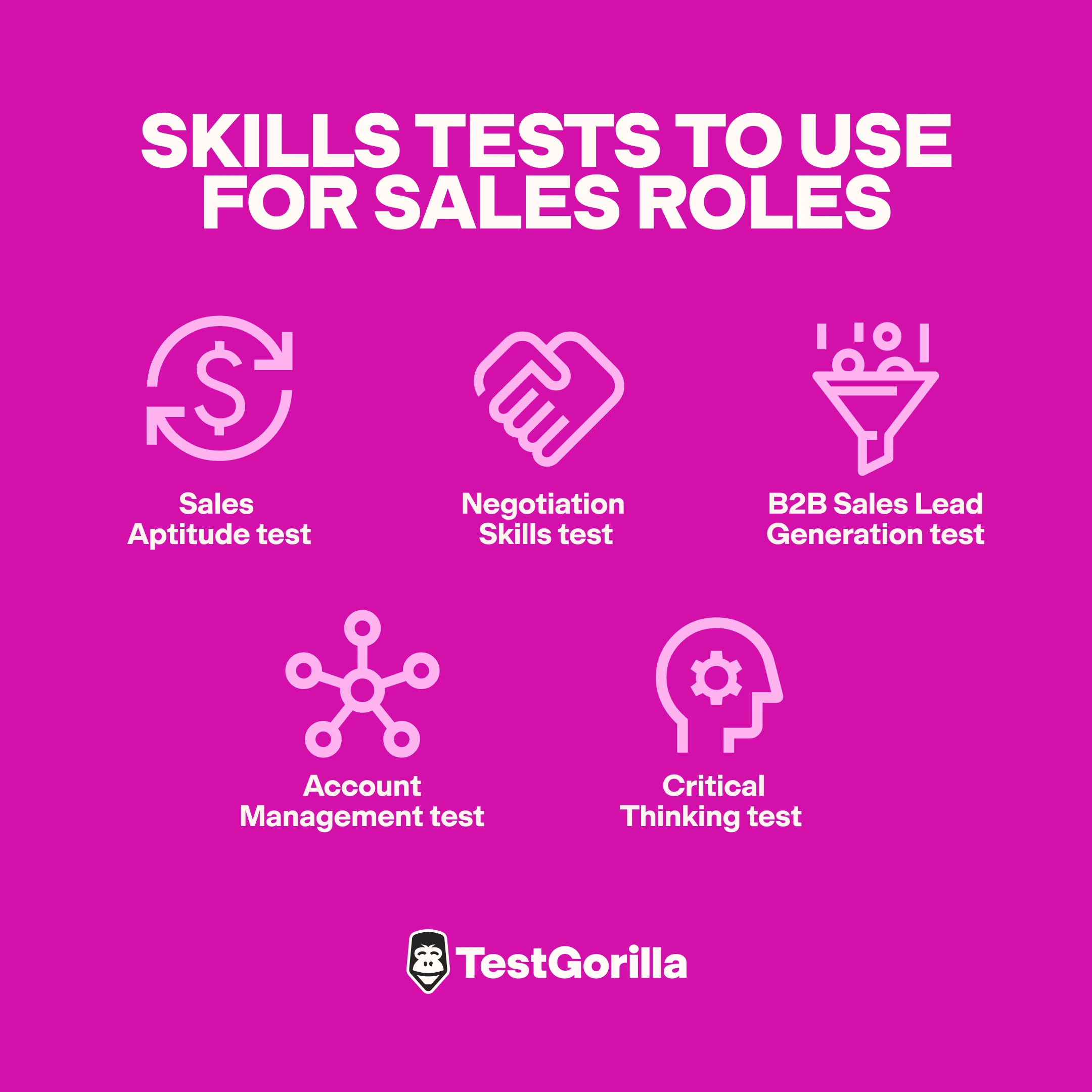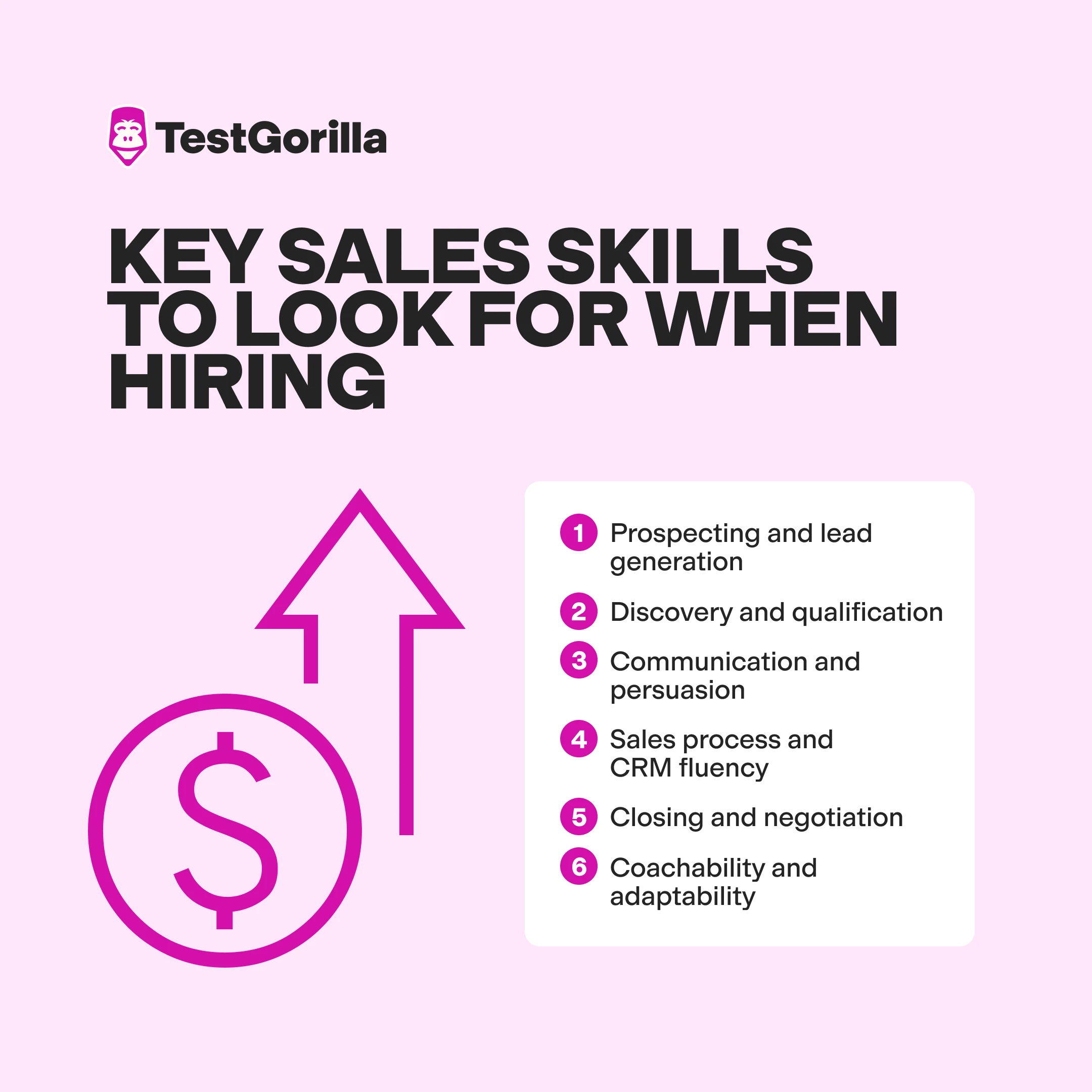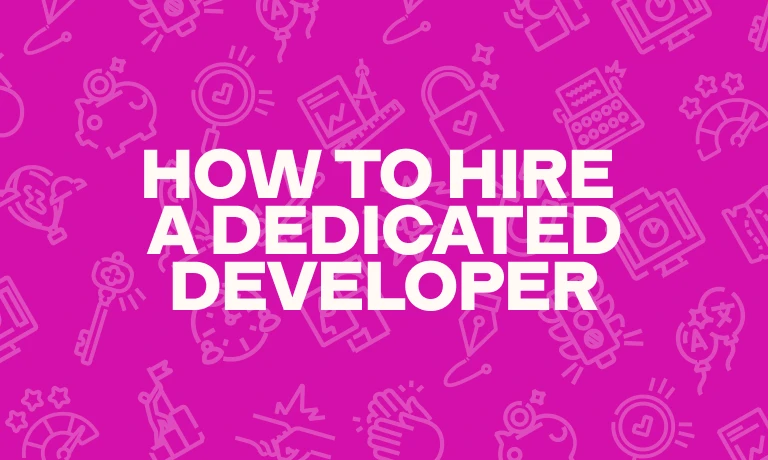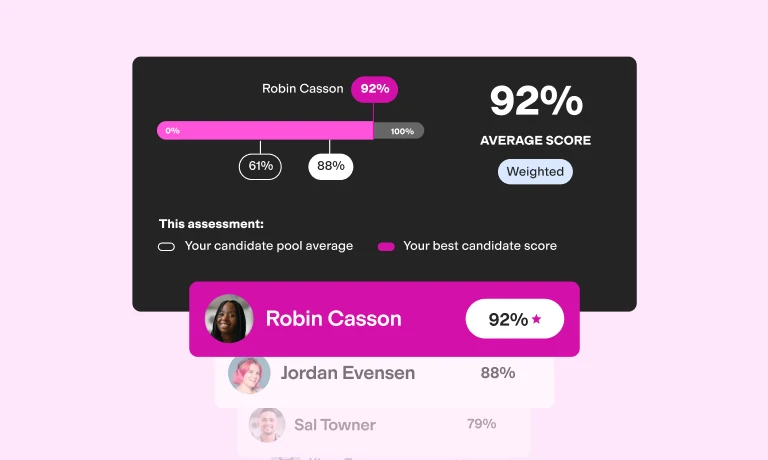6 must-have sales skills + how to evaluate them with sales talent assessments
Top sales agents combine great technical know-how with the emotional intelligence and persuasion needed to close deals with confidence in a sales environment. This mix of hard and soft skills makes them unstoppable on the sales floor.
But spotting these skills during the hiring process isn’t always easy. Sales candidates’ flashy resumes can cloud their real-world capabilities, and their confidence and charm often overpowers everything else during interviews.
The answer to this problem? Multi-measure talent assessments. They’re the most reliable way to uncover a candidate’s true potential – before you invest time in multiple interviews or costly onboarding.
In this guide, we break down the types of sales talent assessments to use (including TestGorilla’s Sales Aptitude test) and the key skills to look for in today’s top-performing sales professionals.
Why traditional sales hiring methods fall short
A big difficulty with hiring salespeople is that, inherently, they’re just that: salespeople. They know how to spin a story, highlight their benefits, and convince you they’re exactly what you need – even if they’re not.
As a result, traditional sales hiring processes, such as interviews and reviewing resumes, fall short. Relying on these alone could mean you end up hiring someone who can talk the talk but can’t walk the walk. This is not only stressful for you, but is off-putting for your customers. You may find pipliness dry up, quotas go unmet, or team morale starts to dip as others pick up the slack.
The remedy? Testing actual sales skills through talent assessments.
These enable you to reduce hiring bias by focusing on objective performance rather than subjective capabilities, speed up time to hire by filtering out candidates early and moving to interviews more quickly, and provide a better candidate experience by pinpointing skills gaps and tailoring onboarding processes to fill them.
Types of sales talent assessments and when to use them
Here are four common assessments for sales candidates or sales leaders, and how to use them throughout your hiring process:
Pre-employment talent assessments
When to use: Before the interview
Talent assessments are a smart way to screen large applicant pools and identify top performers early. They enable you to test job-specific skills, behavioral tendencies, personality traits, and more to see which candidates are a strong match for your open role. Then, you can schedule interviews with only those who’ve proven they have what it takes to succeed.
Using a platform like TestGorilla makes this easy. We offer a library of more than “350+” scientifically validated tests built in collaboration with subject matter experts, so you can assess the traits that actually impact sales success – from communication and lead gen to negotiation and critical thinking.
For success in sales roles, try these skills tests:
Sales Aptitude test
Negotiation Skills test
Account Management test
Mix and match up to five tests – and even add your own questions to tests – to create a custom assessment.
Written exercises
When to use: Before the interview
Written exercises can reveal sales candidates’ natural communication styles and their ability to tailor a message to a specific audience.
Before the interview, ask the candidates you have shortlisted to draft a follow-up email, cold pitch, or an objection response. Make sure the task reflects the real demands of the role, and focus on tone, clarity, and structure when evaluating the completed exercises.
Roleplay scenarios
When to use: During interviews
Roleplays can help you measure how candidates handle objections, navigate discovery calls, and communicate under pressure. They’re a great way to see sales instincts in action.
If you use roleplays in interviews, always let candidates know in advance. Although you want to test their ability to think on their feet, candidates will appreciate a heads-up – a little prep from them often leads to more valuable insights for you.
Video or live pitch tasks
When to use: During interviews
A live pitch is one of the clearest windows into a candidate’s sales ability. You’ll get to see candidates in their flow, observing their sales strategies, how they present, and stay composed.
Look out for a confident opening, a steady flow, and a strong close. This is candidates’ chance to show what they’re made of, so give them the space to shine!
The best insights on HR and recruitment, delivered to your inbox.
Biweekly updates. No spam. Unsubscribe any time.
What are the key sales skills to look for?
When looking for top sales performers, you’ll need to look beyond surface-level charm and educational accomplishments. The best salespeople are often the quietly confident hustlers who have a mix of grit, empathy, and curiosity.
Below, we break down six essential sales skills to prioritize in your hiring process, including what they look like in action and how to assess them effectively.
1. Prospecting and lead generation
Why it matters
You can’t hit your sales targets if there’s no one to sell to, and top salespeople understand the importance of building a steady and secure pipeline. But you can’t spend all day prospecting, so efficiency and quality matter just as much as quantity.
What it looks like
Creative cold outreach
Strong customer relationship management (CRM) usage
Consistent track record of meeting quotas
A clear, proactive approach to pipeline building
How to assess it
Give candidates a pre-interview task: create a presentation on how they’d sell a specific product or service. A good response could involve:
Personalized outreach emails or message samples
A prospect list with context and rationale
Ideas and dates for follow-up cadence
Throughout, look for evidence that the candidate knows their market and understands your company. Bonus points if they tailor the plan specifically to your product or service!
2. Discovery and qualification
Why it matters
Great sales managers know exactly what questions to ask to find the right product for customers. Adept at crafting open questions, they know how to filter out poor-fit prospects early and set the tone for a new deal.
Candidates without this skill may still be personable and charming. But without it, they risk chasing the wrong leads, wasting precious time on dead ends that could be spent nurturing real opportunities.
What it looks like
Structured approach to initial sales calls
Open-ended, layered questions
Curiosity and active listening
Use of terms like “pain points,” “value alignment,” or “discovery call”
How to assess it
Run a mock discovery call. How quickly can the candidate gain trust, uncover needs, and get to the root of a problem without rushing the pitch? Do they guide the conversation without dominating it? Do they listen deeply and ask follow-ups? How do they cope with silences?
Remember, a high-impact discovery conversation isn’t about who talks the most, but who learns the most.
3. Communication and persuasion
Why it matters
Communication skills and sales aptitude go hand in hand. The ability to handle objections, clearly articulate value, and know when it shift gears based on context is crucial to keeping deals moving.
But it’s not just about knowing what to say. Great salespeople need to have excellent non-verbal communication skills, too. The right tone, facial expression, and movement can be just as persuasive as a well-delivered pitch!
What it looks like
Confident but calm delivery
Strong eye contact and body language
Adaptable tone and style
Ability to stay composed
Willingness to push back, when necessary, with tact
How to assess it
Ask candidates to pitch a product of their choice so you can observe their communication style and sales presence. Watch how they explain value, manage objections, and handle curveball questions. This is also the perfect opportunity to see what energizes candidates.
4. Sales process and CRM fluency
Why it matters
Although sales isn’t an exact science, the best reps know how to follow a structured process and use tools – especially CRM platforms – to streamline workflows, prevent leads from slipping through the cracks, and make accurate predictions.
What it looks like
Fluency with your CRM (or similar tools)
Comfort talking through their personal sales process
Consistency in follow-ups and documentation
How to assess it
If possible, have candidates navigate a mock CRM interface. Give them a basic task to complete, such as setting up a new customer profile, following up on a lead, logging a note, or moving a deal to the next stage. Are they confident with terminology? Do they use features like tagging, filters, or activity logs? They don’t need to be perfect, but they should appear comfortable, confident, and capable.
5. Closing and negotiation
Why it matters
Deals don’t close themselves! Strong salespeople expertly balance confidence, urgency, and value framing, so that by the end of a conversation, the customer thinks, “Why wouldn’t we move forward?”
What it looks like
Active listening skills
Ability to emphasize prospects’ needs and goals throughout negotiations
Confidence in reframing objections
A focus on partnership, not pressure
Careful consideration of momentum
Ability to know “when the time is right”
How to assess it
Pose a hypothetical: A customer wants to move forward, but there’s a sticking point – the price is too high, procurement is delayed, or they’re starting to get cold feet. How would the candidate respond? Look for poise, tact, and value-first language – no flashy sales tactics (like offering steep discounts just to get the customer to sign) or high-pressure closes.
6. Coachability and adaptability
Why it matters
Sales is constantly evolving, and candidates who can grow with change will forever be a cut above the rest. They should be open to learning new tools, trying new messaging techniques, and adapting their approaches to align with changing market conditions. This flexibility keeps them relevant, responsive, and ahead of the curve.
What it looks like
Openness to feedback
Comfort with “I don’t know”
Reflective thinking and curiosity
Humility and self-awareness
How to assess it
Ask about a time they received constructive feedback. How did they respond? What changed as a result? There’s no single right answer – even challenging feedback can be appropriate, depending on the situation – but you want to see signs of thoughtfulness, self-awareness, growth, and problem-solving.
Find your next sales agent with TestGorilla
It can be challenging to find a sales agent who can back up their impressive resume and charm in an interview with real-world skills. It’s easy to get swept up by confidence and charisma, only to realise a few weeks in that the results just aren’t there.
That’s where TestGorilla’s talent assessments come in. With more than “350+” expert-vetted assessments and the ability to build custom, multi-measure tests, you can screen candidates for the exact skills that matter in your sales positions.
Ready to find your next sales rockstar? Book a TestGorilla demo today.
Related posts
You've scrolled this far
Why not try TestGorilla for free, and see what happens when you put skills first.




















